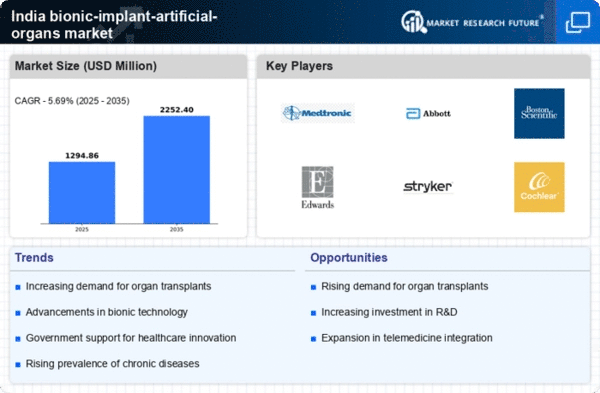Advancements in Biocompatible Materials
The development of biocompatible materials is transforming the landscape of the medical bionic-implant-artificial-organs market. Innovations in materials science have led to the creation of substances that can integrate seamlessly with human tissue, reducing the risk of rejection and complications. For instance, the introduction of advanced polymers and metals has enhanced the performance and longevity of bionic implants. This progress is particularly relevant in India, where the demand for reliable and effective medical solutions is escalating. As healthcare facilities increasingly adopt these advanced materials, the market is likely to experience a significant uptick in the adoption of bionic implants, thereby addressing the needs of patients requiring organ replacements.
Increasing Prevalence of Chronic Diseases
The rising incidence of chronic diseases in India, such as diabetes and cardiovascular disorders, is a crucial driver for the medical bionic-implant-artificial-organs market. As these conditions often lead to organ failure, the demand for innovative solutions like bionic implants is likely to surge. Reports indicate that approximately 77 million people in India are currently living with diabetes, which significantly increases the need for advanced medical interventions. This trend suggests that healthcare providers may increasingly turn to bionic solutions to address the growing patient population requiring organ replacements or support. Consequently, the medical bionic-implant-artificial-organs market is poised for substantial growth as it aligns with the urgent healthcare needs of the population.
Growing Investment in Healthcare Infrastructure
Investment in healthcare infrastructure in India is a pivotal driver for the medical bionic-implant-artificial-organs market. The government and private sector are channeling substantial funds into enhancing healthcare facilities, which includes the integration of advanced medical technologies. Reports suggest that healthcare expenditure in India is projected to reach $372 billion by 2022, indicating a robust commitment to improving healthcare services. This influx of capital is likely to facilitate the adoption of bionic implants and artificial organs, as hospitals and clinics upgrade their capabilities to provide cutting-edge treatments. Consequently, the medical bionic-implant-artificial-organs market stands to benefit from this trend, as improved infrastructure supports the implementation of innovative medical solutions.
Rising Awareness and Acceptance of Bionic Solutions
The increasing awareness and acceptance of bionic solutions among the Indian population is a significant driver for the medical bionic-implant-artificial-organs market. Educational campaigns and success stories of patients benefiting from bionic implants are contributing to a shift in public perception. As more individuals become informed about the potential of these technologies, the demand for bionic implants is likely to rise. Surveys indicate that approximately 60% of the population is now open to considering bionic solutions for organ replacement, reflecting a growing trust in these advanced medical interventions. This trend suggests that the medical bionic-implant-artificial-organs market may experience accelerated growth as societal acceptance continues to evolve.
Collaboration Between Research Institutions and Industry
The collaboration between research institutions and the medical industry is fostering innovation in the medical bionic-implant-artificial-organs market. Partnerships aimed at developing new technologies and improving existing bionic solutions are becoming increasingly common. These collaborations often lead to breakthroughs in design, functionality, and patient outcomes. For instance, joint ventures between universities and medical device companies have resulted in the creation of more effective bionic organs tailored to the specific needs of patients in India. This synergy is likely to enhance the competitiveness of the medical bionic-implant-artificial-organs market, as new products emerge that address unmet medical needs and improve the quality of life for patients.
















